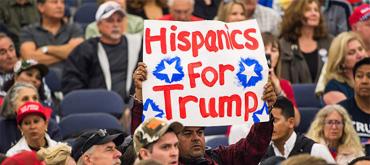
The Democratic Party, with a field of nearly two dozen announced candidates, is getting set to open its debate schedule for the 2020 presidential campaign. The first debate is set for Miami and in anticipation, Team Blue is placing a great deal of energy behind a very serious outreach effort -- appealing to the Hispanic/Latino voters.
With Florida coveted both as a swing state and a state rich Electoral College votes, any candidate needs to be successful in capturing the a significant percentage of the more than 2 million Latino voters across the state. That demographic is one that carries far more complexity than the election wonks are sometimes willing to admit.
The two largest factions within the Latino electorate are the exiled Cuban community and the recently transplanted Puerto Ricans. Many consider these sectors as firmly entrenched party-wise: The Cubans are looked at as de facto Republican votes, and the Puerto Ricans are counted on to vote Democratic in the voting booth.
Neither expectation is a guarantee.
In South Dade the Cubans are looking at second-generation voters who may not be as beholden to a party. As for the Puerto Rican voters, while they arrived from an island seen as a Democratic stronghold, the tendency of those new arrivals has been to register as Independent. They can no longer be counted as an automatic windfall for the Democrats. The result is both, parties need to be step up their game Latinos in attracting Latinos for next year -- and they know it.
In discussing the issue with Politico, state Sen. Javier Rodríguez, D-Miami, noted the less-than-impressive Democratic result with Latinos in the last election. “We had a message, but there was a delay in getting it out,” Rodríguez said. “The general election was only 11 weeks long. There were some operational problems that I don’t think will be there in 2020.”
Except, some challenges are already obvious. For example, while some of the Democratic candidates have landed in Miami already, one notable omission is the frontrunner in the polls -- Joe Biden.
Ahead of the debate a National Association of Latino Elected and Appointed Officials held a forum. Eight candidates spoke to the crowd Friday evening to go over policy issues specific to Latino interest in the state. Biden was not in town for the event, said to include the largest association of Latino officials in the country. Trump, meanwhile, is looking to leverage what Republicans see as a trend towards attracting the Latino segment with some success.
On Tuesday Lt. Gov. Jeanette Nuñez will arrive in Miami to meet with Vice President Mike Pence to kick off the re-election team’s outreach. The effort is called “Latinos For Trump” and is starting in a GOP-rich area replete with Cuban voters. This follows Trump's very impressive rally in Orlando to last week to kick off his re-election campaign. He scored large crowds in rainy conditions, while the Democrats flailed in staging what were lightly attended counter-rallies the same day in the Puerto Rican-heavy area. Additionally, Trump raked in tens of millions of dollars in one day after formally announcing.
This is not a matter of the GOP hoping to chip away any number of Latino voters it can -- the bid to earn their vote is a legitimate threat. Democratic officials commonly refer to a soft amount of support for Trump/GOP, generally pegged at 35 percent. (That is the turnout from prior elections, as well as the supposed current approval polling for the president among Hispanics/Latinos.) However, some actual results in 2016 defy the Dems' optimism. Despite supposed waning support, President Trump was able to win Florida over Hillary Clinton. And in the 2018 midterms the Republicans were able to win the Governor’s Mansion, and unseat a stalwart senator in Bill Nelson with a stronger-than-expected showing among Latino voters.

Even the issues for this election are not as clearly defined for the party planners. While immigration has been the obvious choice of topic for Democrats to negatively impact the president, that issue is not an automatic win. A toughened stance on illegal immigration is actually favored by a large number of Latinos who went through the naturalization process to become citizens.
Also, this election sees the Venezuelan crisis looming as a regular news item and the Republicans have been particularly active in trying to bring democracy back to that nation. As socialism has become a favored topic for a number of Democrats, Venezuela becomes a thorny issue. That system’s failures have been grievous for the citizens who live with it. Also, implicating the Cuban participation in supporting the socialist regime in Venezuela only helps to entrench Republicans within the Cuban-American community.
We now wait to see if the leadership of both parties reads and reacts to the electorate's ever-shifting landscape. Florida, as always, is a crucial state in the national election, and it remains a difficult one to pin down with standard electoral practices.
Brad Slager, a Fort Lauderdale freelance writer, wrote this story exclusively for Sunshine State News. He writes on politics and the industry and his stories appear in such publications as RedState and The Federalist.


